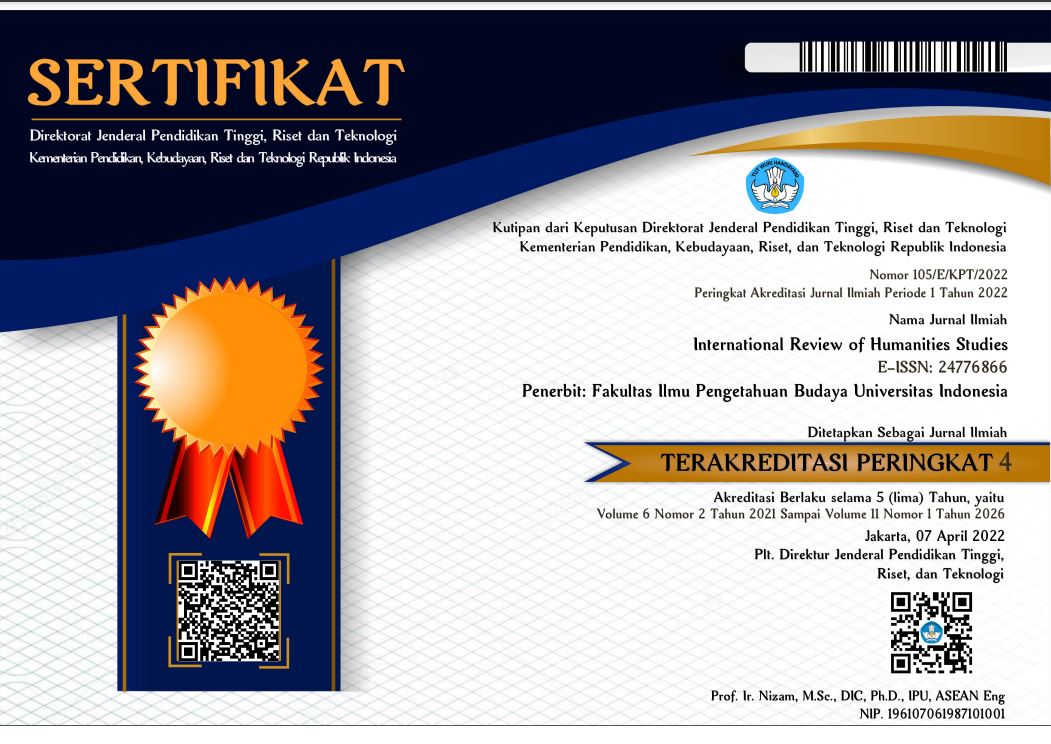International Review of Humanities Studies

Abstract
This study examines the impact of China's electric vehicle distribution on the cultural identity of Jakartans. With increasing air pollution and congestion in the capital city, electric vehicles have emerged as a sustainable transportation solution. This study uses a qualitative approach with data collection through interviews with 5 sources of information, namely Mr. Susanto, Mr. Robert, Mrs. Astrid, Mrs. Ratna and Mrs. Jeane. This was done to understand the adoption of electric vehicles affecting social values, cultural interactions, and community mobility patterns. The results of the study show that electric vehicles are not only an alternative transportation, but also a symbol of status and modernity. People are starting to adopt a more environmentally friendly lifestyle, encouraging the formation of communities that care about sustainability issues. However, challenges such as skepticism about product quality and concerns about losing jobs in the traditional transportation sector have also emerged, creating resistance. To overcome these challenges, public education and collaboration between government, industry, and communities are essential. With an inclusive approach, the distribution of electric vehicles can improve the quality of life of Jakartans and shape a more progressive cultural identity. This study is expected to provide new insights into the relationship between technology, culture, and society in the modern era.
References
Aziz, M., Marcellino, Y., Rizki, IA, Ikhwanuddin, SA, & Simatupang, JW (2020). Study Analysis of technological developments and Indonesian government support for electric cars. TESLA: Journal of Electrical Engineering, 22(1), 45–55
Gooday, G. (2002). The Electric Vehicle and the Burden of History. JSTOR.
Haryanto, B. (2018). Climate change and urban air pollution health impacts in Indonesia. Climate Change and Air Pollution: The Impact on Human Health in Developed and Developing Countries, 215–239.
Hawkins, T.R., Singh, B., Majeau‐Bettez, G., & Strømman, A.H. (2013). Comparative environmental life cycle assessment of conventional and electric vehicles. Journal of Industrial Ecology,17(1), 53–64.
Khalidazzia, H. (2024). Competitive Advantage of the Indonesian Automotive Industry in the Framework IJEPA (2015-2019). Islamic University of Indonesia.
Kumparan. (2024). Wuling Leads Indonesia's Electric Car Market, BYD and MG Shift Hyundai.https://kumparan.com/kumparanoto/wuling-leads-the-market-of-listed-cars-indonesia-byd-and-mg-shifts-hyundai-23JnSPGVQ18
Kurniawan, AHAT (2021). Environmentally Friendly Behavior Of State Police Members Republic Of Indonesia: A Literature Review. Journal of Police Science, 15(3), 19.
Panuju, R. (2019). Marketing communication: marketing as a communication symptom communication as a marketing strategy. Prenada Media.
Saleh, S. (2017). Qualitative data analysis. Pustaka Ramadhan, Bandung.
Sierzchula, W., Bakker, S., Maat, K., & Van Wee, B. (2014). The influence of financial incentives and other socio-economic factors on electric vehicle adoption. Energy Policy, 68, 183–194.
Tirtayasa, S., Khair, H., & Yuni Satria, SE (2024).Marketing Management in Moderating Interest in Buying Electric Cars. umsu press.
Giddens, A. (1990).The Consequences of Modernity. Stanford University Press.
International Energy Agency (IEA). (2021).Global EV Outlook 2021: Accelerating ambitions despite the pandemic. IEA Publications.
Ministry of Transportation of the Republic of Indonesia. (2022).Electric Vehicle Statistics Report in Indonesia.
Handayani, S. (2022).Public Skepticism Towards Electric Vehicles: Challenges in Adoption of New Technology in Jakarta. Journal of Transportation and Environment, 10(2), 85-98.
Liu, X., Zhang, Y., & Chen, L. (2019).Cultural Exchange through Electric Vehicles: The Case of China and Indonesia. Asian Journal of Cultural Studies, 15(1), 45-62.
Pratiwi, R., & Suwondo, H. (2021).The Impact of Congestion and Air Pollution on Air Quality Long Live the People of Jakarta. Journal of Environmental Health, 12(3), 101-114.
Setiawan, A. (2020).Mobility Changes in Jakarta: Adopting Electric Vehicles as a Solution Sustainable Transportation. Urban Journal, 9(4), 233-245.
Supriyanto, M. (2021).Social Transformation in the Era of Electric Vehicles in Indonesia. Journal Social and Cultural, 8(2), 77-89.
Recommended Citation
Kuswardani, Suci and Lawanda, Ike Iswary
(2025)
"IMPACT ANALYSIS OF CHINA'S ELECTRIC VEHICLE DISTRIBUTION ON CULTURAL IDENTITY JAKARTA SOCIETY,"
International Review of Humanities Studies: Vol. 10:
No.
1, Article 1.
DOI: 10.7454/irhs.v10i1.1360
Available at:
https://scholarhub.ui.ac.id/irhs/vol10/iss1/1
Included in
Anthropology Commons, Art and Design Commons, Creative Writing Commons, Cultural Heritage Law Commons, Education Law Commons, Film and Media Studies Commons, History Commons, Intellectual Property Law Commons, International and Area Studies Commons, Legal Writing and Research Commons, Linguistics Commons, Museum Studies Commons, Philosophy Commons, Urban Studies and Planning Commons


